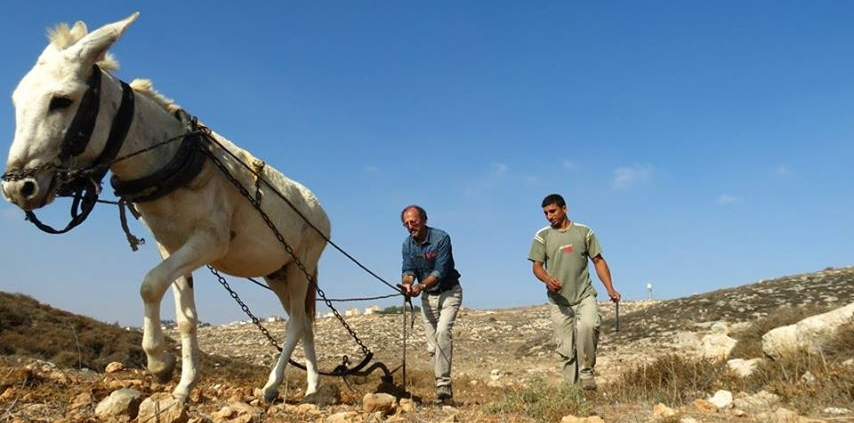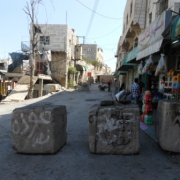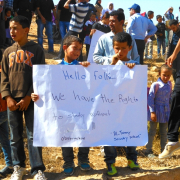Terra rubata / Land expropriation in the South Hebron Hills

Awad Said è un trentenne che ha trascorso tutta la sua vita nella piccola comunità di Umm el Arayes nelle South Hebron Hills, in cui possiede un piccolo appezzamento di terra. Per molte generazioni la famiglia di Said ha lavorato la terra e ha portato gli animali al pascolo sui versanti di queste gentili colline, oggi sotto il totale controllo israeliano.
{tab=Terra rubata}
La famiglia possiede dei documenti legali che risalgono all’era ottomana attestanti la proprietà della terra, ma dalla nascita, nel 1998, dell’avamposto illegale di Mitzpe Yair stabilitosi in cima alla collina adiacente, sembrano non avere più alcuna importanza. Negli anni ’90, molti componenti della famiglia lavoravano in Israele e la nascita della colonia non sembrò avere un impatto particolarmente negativo sulle loro esistenze. Tutto cambiò con lo scoppio della seconda Intifada. In nome della sicurezza, l’occupazione israeliana si fece più oppressiva, intrappolando i palestinesi in un dedalo di regole e restrizioni. Ottenere dei permessi lavorativi per Israele si fece sempre più difficile e molti lavoratori decisero di tornare alle loro terre.
E fu allora che incominciarono i problemi con i coloni. L’avamposto di Mitzpe Yair, collegato alla colonia di Susya, è abitato dai coloni tra i più violenti della zona, estremisti religiosi mossi da un’ideologia nazionalista. L’avamposto, che risulta illegale sia per il diritto internazionale, sia per la legge israeliana, è composto oggi da una quindicina di roulotte e tre strutture permanenti. Negli anni passati ha continuato ad espandersi su terra palestinese con l’aggiunta di alcune serre in cui vengono coltivati prodotti biologici, che vengono venduti a prezzi molto alti sul mercato israeliano, garantendo ai coloni delle considerevoli entrate. Un ordine di demolizione è stato emesso, ma ad oggi ancora non è stato applicato.
Negli ultimi anni i coloni stanno inoltre minacciando di sottrarre alla famiglia di Awad il loro appezzamento di terra. Gli israeliani stanno infatti impedendo loro di accedere alle loro terre e hanno iniziato ad arare il terreno e successivamente a coltivare delle verdure. Grazie all’aiuto di un avvocato e di alcuni attivisti la famiglia è riuscita a portare il caso di fronte a un giudice israeliano, il quale, in prima istanza, ha dato loro ragione. I coloni non si sono però dati per vinti e hanno fatto ricorso. Al momento la terra è considerata “contesa”, fino a nuove indicazioni del giudice, ed è pertanto proibito accedervi. Nonostante l’ordinanza, i coloni continuano ad entrare nell’appezzamento e a coltivarlo senza pagarne le conseguenze, mentre ai palestinesi non è permesso fare lo stesso, in quanto le forze israeliane li arresterebbero. Discriminazioni nell’applicazione delle legge sono molto comuni in queste aree, in cui la collaborazione tra i soldati e i coloni sembra essere sempre più forte.
E’ difficile quantificare a quanto ammontino le terre sottratte ai palestinesi nelle South Hebron Hills. Gli avamposti continuano ad espandersi e ne vengono creati di nuovi. Solo nel distretto di Hebron ci sono oggi circa 40 avamposti, molti dei quali concentrati nell’area di Masafer Yatta. Gli avamposti inoltre si espandono in modo poco visibile, ad esempio, piantando alcuni alberi in area palestinese per poi reclamarla come propria dopo pochi anni. Un altro metodo può essere la costruzione di piccoli depositi per gli attrezzi che vengono poi riconvertiti in case vere e proprie.
L’uso della violenza è tuttavia uno dei metodi più diffusi per l’esproprio di terre: gli alberi vengono sradicati oppure tagliati, le olive rubate, i pastori vengono attaccati mentre portano al pascolo gli animali, i quali a loro volta vengono uccisi o non hanno modo di raggiungere le cisterne dell’acqua per abbeverarsi. Attacchi di questo tipo, la cui intensità aumenta nel periodo del raccolto o della semina, sono ovviamente atti criminali anche per la legge israeliana, ma non vengono quasi mai adottati provvedimenti nei confronti dei perpetratori. L’esercito, che secondo il diritto internazionale è obbligato a proteggere i civili e a amministrare i territori occupati tenendo presente la scurezza degli abitanti, da una parte non tutela i palestinesi dagli attacchi dei coloni e dall’altra è spesso il principale autore di tali crimini.
Le colonie e gli avamposti non sono l’unica ragione della sottrazione delle terre. Negli anni 80 le autorità israeliane dichiararono gran parte dell’area di Masafer Yatta (circa 30.000 dunum) zona militare chiusa chiamata “Firing Zone 918”, a causa della quale 14 comunità palestinesi sono minacciate d’essere cacciate. Le autorità palestinesi considerano le comunità come illegali e gli abitanti come dei residenti stagionali e non permanenti, in quest’ultimo caso anche in base alla legge militare israeliana avrebbero il diritto a rimanere. Il danno economico arrecato alle comunità è considerevole in quanto per la maggior parte dei palestinesi l’attività agricola rappresenta la principale fonte di guadagno e l’accesso alle terre è pertanto di vitale importanza. Secondo l’ARIJ (Applied Research Institute Jerusalem) il 90% della popolazione delle South Hebron Hills vive di agricoltura e pastorizia e solo il 10% lavora in Israele. Stando ai dati del Ufficio Centrale di Statistica palestinese, il tasso di povertà nell’area è molto elevato: il 23,4% della popolazione si trova in una condizione di grave povertà mentre la media della Cisgiordania si attesta attorno al 13,9%, e il 33% è considerato povero, contro il 23% della Cisgiordania.
{tab=Land expropriation in the South Hebron Hills}
Awad Said is a young man in his thirties who has spent all of his life in the small community of Umm el Arayes in the South Hebron Hills where he owns a small piece of land. For generations Said’s family has worked the land and grazed their herds on the slopes of these gentle hills, which are now under complete Israeli control.
The family holds legal documents from the Ottoman period attesting their ownership of the land, but since the establishment of the illegal Mitzpe Yair outpost on the top of the hill in 1998, these papers have become irrelevant. During the late ‘90s many members of the family worked in Israel and the new settlement did not seem to have such a negative impact on their lives. Everything changed, however, with the outbreak of the Second Intifada. In name of security the Israeli occupation became more oppressive, entangling Palestinians in a maze of rules and restrictions. Obtaining work permits for Israel became increasingly difficult and many workers decided to return to their lands for income.
It was at this point that the real trouble with the settlers began. The settlers living in Mitzpe Yair, an outpost linked with the settlement of Susya, are among the most violent in the area, motivated by extremist religious and nationalist ideologies. The outpost, which is illegal according to both Israeli and international law, today hosts eight families sharing 15 caravans and three permanent structures. In the past few years the outpost has continued to expand on the Palestinian land, with the construction of greenhouses where the settlers grow organic food – which fetches high prices on the Israeli market and provides the settlers with a more than comfortable income. A demolition order was issued for the greenhouses by the Israeli District Coordination Office and should, theoretically, have been enforced at the end of last month, but nothing has happened so far.
In the last few years the settlers have also threatened to steal a piece of land that has been in Awad’s family for decades. The settlers have prevented the family from accessing their land and started planting and growing vegetables in the area. Thanks to the help of a lawyer and activists the family managed to go to the Israeli Court, which found in their favour. The settlers however refused to give up and decided to appeal the decision. The land is now considered “disputed land” until the court reaches its decision, and been declared off limits to either party. Despite this court order, settlers continue to enter and plant crops on the land unhindered, while the Palestinian family are forbidden from doing so under threat of arrest by Israeli forces, who apply the law only when it comes to Palestinians. Discrimination in the enforcement of law is very common in these lands, where the collaboration between soldiers and settlers appears to be tightening.
It is hard to quantify the total amount of land taken from the Palestinians in the South Hebron Hills. The outposts continuously expand and new ones are frequently established. In the Hebron governorate alone, there are approximately 40 outposts, concentrated predominantly in the Masafer Yatta area. The size of the outposts increase in subtle ways, with, for example, the planting of a few trees, followed by preventing the Palestinian landowners’ access to the area, and the eventual take over of the land after a few years. Another method is the construction of a small storage space that slowly transforms into a residency.
One of the most common methods for land expropriation however, is violence: the uprooting and cutting of trees, stealing olives, attacking the shepherds while they graze their livestock, killing their animals or preventing them from reaching water cisterns are all common practices in the South Hebron Hills. Attacks of this type, which escalate during planting and harvesting, are also illegal under Israeli law, however the crimes usually go unpunished. The army, that, according to international humanitarian law, is obliged to protect the civilian population and to administer the occupied territory for inhabitants safety, on the one hand do not safeguard the Palestinians from settler harassment, and on the other are very often the main perpetrator.
Settlements and outposts are not the only reason of the expropriation of land. In 1980s the Israeli authorities declared most of the area of Masafer Yatta (around 30,000 dunums) a closed military zone, so called “Firing Zone 918”, which placed 14 Palestinian communities under threat of eviction. Israeli authorities have deemed the communities illegal and the inhabitants are officially considered seasonal dwellers and not permanent residents, a status that under Israeli military law would allow them to stay.
The economic damage of this situation is considerable since their main source of local Palestinians’ income comes from rural activities where access to their lands is vital. According to ARIJ, the Applied Research Institute Jerusalem, the main economic activity of around 90% of the population in the South Hebron Hills is indeed agriculture, with only 10% of the population working in Israel. The poverty rate in the area runs very high, with the Palestinian Central Bureau of Statistics finding that 23.4% of inhabitants live in conditions of deep poverty, while the West Bank average is of 13.9%, and 33% of people in the Hebron Governorate are considered poor, compared to an average of 23% across the West Bank.
{/tabs}









Lascia un Commento
Vuoi partecipare alla discussione?Sentitevi liberi di contribuire!